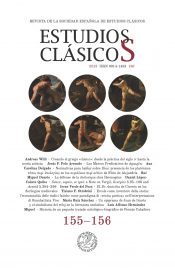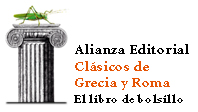Normativas para hablar sobre Dios: presencia de los platónicos τύποι περί θεολογίας en los κεφάλαια περί αἰτίου de Filón de AlejandríaPrinciples to Talk About God: Presence of the Platonic τύποι περὶ θεολογίας in the κεφάλαια περὶ αἰτίου of Philo of Alexandria
Ana Carolina Delgado
Resumen
En el marco de su comentario a Gn 6,7 donde se hace referencia a la cólera de Dios, Filón introduce una discusión sobre el uso del antropomorfismo en la Escritura. Según el alejandrino, el lenguaje para hablar apropiadamente de Dios ha de orientarse según dos principios capitales (κεφάλαια περί αἰτίου), a saber, “Dios no es como el hombre” (Nm 23,19) y Dios “como un hombre educará a su hijo” (Dt 8,5). En este trabajo me propongo mostrar que las normativas para hablar sobre Dios consignadas por Filón en el tratado Sobre la inmutabilidad de Dios 53 son un recurso argumentativo de procedencia platónica. Para demostrarlo presento un examen sobre la notable correspondencia que existe, a mi modo de ver, entre el tratamiento que Filón dispensa al antropomorfismo en ese tratado y la sección de República 2.377-3.414 donde Platón, para garantizar una adecuada producción de representaciones sobre los dioses, confecciona unos τύποι περί θεολογίας.
Palabras clave: discurso; falsedad; mito; alegoría
Abstract
Within his comment to Gn 6,7 – in which God’s anger is referred – Philo introduces a discussion about anthropomorphism in the Scriptures. According to the author, in order to speak properly about God, language should agree with two capital principles (κεφάλαια περί αἰτίου), namely, “God is not like man” (Nm 23,19) and God “will educate his son like men do” (Dt 8,5). In this paper, the purpose is to show that norms indicating how to speak about God – exposed by Philo in his treatise The Immutability of God (Deus) § 53- are an argumentative resource of platonic origin. In order to show this, I present an examination on the remarkable correspondence I see between how Philo treats anthropomorphism in the treatise and the section 2.377-3.414 of Republic, in which Plato builds τύποι περί θεολογίας in order to ensure an adequate production of representations of gods.
Keywords: discourse; falsehood; myth; allegory
Referencias bibliográficas
AMIR, Y. (1983) Die hellenistische Gestalt des Judentums bei Philon von Alexandrien, Neukirchen, Neukirchener Verlag.
BLÖNNINGEN, Ch. (1992) Die griechische Ursprung der jüdisch-hellenistischer Allegorese und ihre Rezeption in der alexandrinischen Patristik, Fráncfort del Meno, Europäische Hochschulschriften.
BORDT, M. (2006) Platons Theologie, Friburgo / Múnich, Karl Alber.
BURNET, J. (1900-7) Platonis opera, 5 vols., Oxford, Clarendon Press.
COHN, L. & HEINEMANN, I. (1962) Philo von Alexandria. Die Werke in deutscher Übersetzung, vol. I, Berlín, Walter de Gruyter.
COHN, L. & WENLAND, P. (1896-1915) Philonis Alexandrini Opera quae supersunt, 7 vols, Berlín, Gregorii Reimeri.
DREYER, O. (1970) Untersuchungen zum Begriff des Gottgeziemenden in der Antike. Mit besonderer Berücksichtigung Philons von Alexandrien, Hildesheim, Georg Olms Verlag.
KAMESAR, A. (1998) “Philo, the Presence of ‘Paideutic’ Myth in the Pentateuch and the Principles or Kephalaia of Mosaic Discourse”, The Studia Philonica Annual 10, 34-66.
KAMESAR, A. (1997) “The Literary Genres of the Pentateuch as Seen from the Greek Perspective: The Testimony of Philo of Alexandria”, The Studia Philonica Annual 9, 143-189.
MARTÍN, J.P. (2009-2016) Obras completas de Filón de Alejandría, 5 vols., Madrid, Editorial Trotta.
OTTE, K. (1968) Das Sprachverstädnis bei Philo von Alexandrien. Sprache als Mittel der Hermeneutik, Tubinga, Mohr.
PEPIN, J. (1976) Mythe at allégorie. Les origines grecques et les contestations judéo-chrétiennes, París, Études Augustiniennes.
WINSTON, D. & DILLON, J. (1983) Two Treatises of Philo of Alexandria. A Commentary on De Gigantibus and Quod Deus Sit Immutabilis, Chicago, Scholars Press.
WOLFSON, H. (1962) Philo. Foundations of Religious Philosophy in Judaism, Christianity and Islam, I-II, Cambridge (MA), Harvard University Press.
Revista
-
Sobre la revista
Página principal
-
Estatutos
Estatutos de la Revista Estudios Clásicos
-
Código ético
Declaración de buenas prácticas
-
Normas de recepción y envío
Indicaciones para envíos de artículos
-
Equipo editorial
Consejos de redacción y asesor
-
Comité de honor
Comité de honor
Información
-
Para autores
Publicar con nosotros
-
Para evaluadores
Normas para evaluar artículos
-
Para bibliotecas
Información bibliográfica
-
Contacto
Cuestiones y preguntas
Publicar en EClás
-
Envío de originales
Artículos y reseñas
-
Normas de publicación
Descarga normas en PDF
-
Estilo CSL EClás
Estilo CSL EClás
-
Índices de calidad
Bases de datos e impactos


 c/ Serrano, 107
c/ Serrano, 107